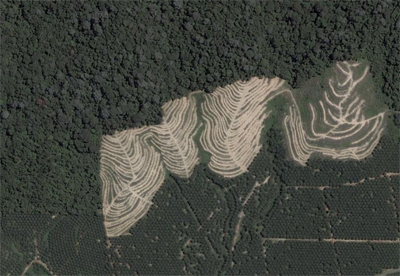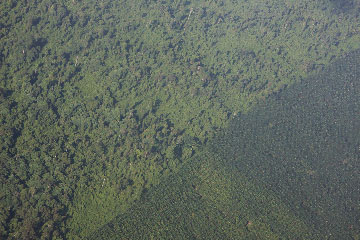Palm oil companies propose satellite monitoring of their plantations to ensure sustainability
mongabay.com
November 5, 2008
|
|
The Roundtable on Sustainable Palm Oil (RSPO) is considering a proposal to use satellite imagery to enforce criteria that high value conservation areas are not converted to oil palm plantations, reports Ian Wood of the Telegraph. The move would boost RSPO’s credibility at a time when the industry-lead sustainability initiative is under fire from environmentalists who say its performance to date suggests it is merely an exercise in greenwashing.
The push to create an effective mechanism for monitoring is being led by Unilever and other firms that sell in markets where the environmental performance of products is a concern. Unilever — the world’s largest consumer goods company and among the largest buyers of palm oil — announced May 1 that it would source all of its palm oil buying to certified suppliers by 2015.
 Oil palm plantation expansion at the expense of natural forest in the Malaysian state of Johor. Image courtesy of NASA’s Earth Observatory / Google Earth. |
Still there is no guarantee the measure will pass when it comes to a vote at an upcoming RSPO meeting in Bali on November 18th. The initiative is opposed by smaller palm oil producers that sell domestically and in markets that are less responsive to environmental performance, including China and India.
Oil palm expansion is cited by scientists and environmentalists as a major driver of deforestation in Indonesia and Malaysia — a recent study estimated that at least 1 million hectares of forest in Malaysia and 1.7 million ha in Indonesia were converted for oil palm between 1990 and 2005.
 Oil palm plantations near Lahad Datu, Malaysia. Photo by Rhett A. Butler |
For their part, some oil palm producers (including RSPO members) are working to reduce the environmental impact of existing estates by curtailing use of pesticides and fertilizers; capturing palm oil mill effluent before it goes enters streams and creeks; cutting burning of plantation waste; and maintaining and even expanding forest corridors along waterways to create connectivity between forest fragments and reduce erosion. Efforts to boost palm oil yields through selective-breeding programs further offer the potential increase net production without the need to expand the area under cultivation. Finally because oil palm is the highest-yielding mass market oilseed, responsible palm oil production offers more vegetable oil per unit of area than other widely-grown crops including soy, canola, or rapeseed. Thus oil palm expansion on abandoned agricultural lands could offer producers a more effective way to sustainably meet growing demand for vegetable oils than with other oilseeds.
Ian Wood. Palm oil agreement could lead to logging moratorium. The Telegraph 4 Nov 2008
Related
Falling palm oil price makes palm biodiesel viable, may offer target for NGOs
(9/10/2008) Plunging palm oil prices are increasing its attractiveness as a biofuel feedstock and thereby helping buoy demand for the oilseed, reports Reuters.
Palm oil industry moves into the Amazon rainforest
(7/9/2008) Malaysia’s Land Development Authority FELDA has announced plans to immediately establish 100,000 hectares (250,000) of oil palm plantations in the Brazilian Amazon. The agency will partner with Braspalma, a local company, to form Felda Global Ventures Brazil Sdn Bhd. FELDA will have a 70 percent stake in the venture. The announcement had been expected. Last month Najib said Malaysia would seek to expand its booming palm oil industry overseas. The country is facing land constraints at home.
Sustainability conference reveals a rift in the Malaysian Palm Oil Council May 1, 2008
Last month’s sustainability conference sponsored by the Malaysian Palm Oil Council (MPOC) revealed a rift between some planters and the industry marketing organization. Speaking on the condition of anonymity, several oil palm plantation executives distanced themselves from a video created by the MPOC as well as closing remarks by the group’s CEO, Tan Sri Datuk Dr. Yusof Basiron. They said the video and comments provided ammunition for NGOs that accuse the MPOC of greenwashing.
Malaysian palm oil industry puts sustainability in the spotlight April 17, 2008
Seeking to differentiate its palm oil from that produced less responsibly in other countries, the Malaysian Palm Oil Council (MPOC) sponsored a three-day meeting this week in Kota Kinabalu, on the island of Borneo. The International Palm Oil Sustainability Conference (IPOSC) aimed to promote the virtues of palm oil and address environmental concerns that many green groups say plague the industry.
Palm oil industry prepares green initiative to counter criticism
(1/18/2008) Global food and consumer goods giants are backing a plan to certify that palm oil is produced in a way that doesn’t drive destruction of tropical rainforests, reports The Wall Street Journal. The move comes as the palm industry is facing increasing scrutiny — and consumer backlash — for its practices which scientists say are driving large-scale destruction of forests across Indonesia and Malaysia, resulting in massive greenhouse gas emissions.
Eco-friendly palm oil could help alleviate poverty in Indonesia – Palm oil is not a failure as a biofuel
(April 4, 2007) The Associated Press (AP) recently quoted Marcel Silvius, a renowned climate expert at Wetlands International in the Netherlands, as saying palm oil is a failure as a biofuel. This would be a misleading statement and one that doesn’t help efforts to devise a workable solution to the multitude of issues surrounding the use of palm oil.
Palm oil doesn’t have to be bad for the environment
(April 4, 2007)
As traditionally practiced in Southeast Asia, oil-palm cultivation is responsible for widespread deforestation that reduces biodiversity, degrades important ecological services, worsens climate change, and traps workers in inequitable conditions sometimes analogous to slavery. This doesn’t have to be the case. Following examples set forth by the Roundtable on Sustainable Palm Oil and firms like Golden Hope Plantations Berhad, a Malaysian palm-oil producer, oil palm can be cultivated in a manner that helps mitigate climate change, preserves biodiversity, and brings economic opportunities to desperately poor rural populations.